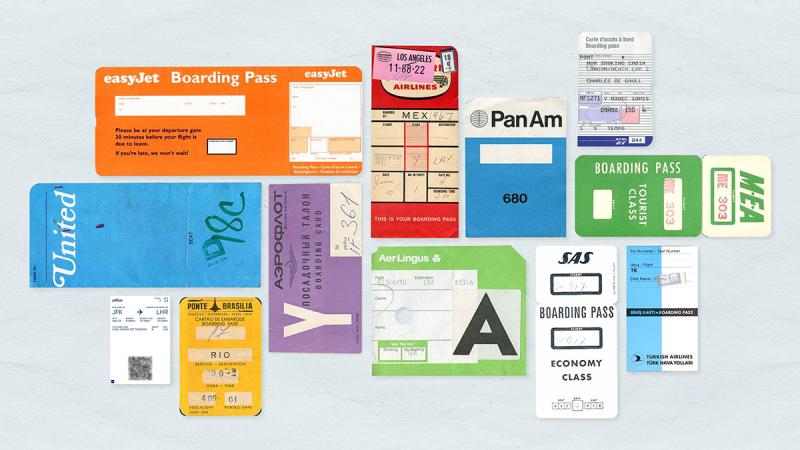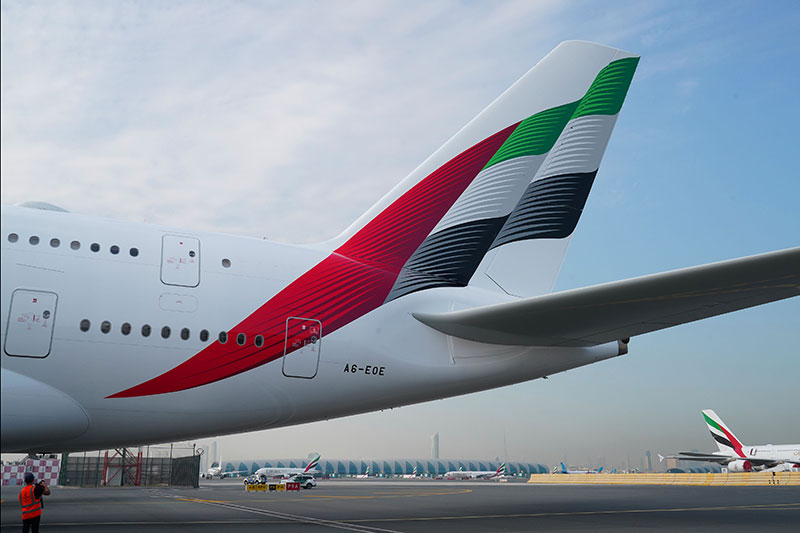Airline Is Phasing Out Paper Boarding Passes - A Farewell In The Age Of Digital Travel
An airline is phasing out paper boarding passes and people are asking whether or not other airlines will make a similar change. The aviation industry is undergoing a significant transformation towards more digitalization.
Author:Finn WildeReviewer:Michael RachalSep 20, 202311.6K Shares682.4K Views

An airline is phasing out paper boarding passesand people are asking whether or not other airlines will make a similar change. The aviation industry is undergoing a significant transformation towards more digitalization.
Emirates On Phasing Out Paper Boarding Passes
Very recently, Emiratesmandated the majority of its travelers traveling from Dubai International Airport to utilize mobile boarding cards in lieu of traditional paper ones.
The company said in a release:
“„This initiative will significantly reduce paper waste while simultaneously offering a convenient and speedy digitized check-in experience for passengers departing Dubai. It reduces the risk of lost or misplaced boarding passes, giving passengers peace of mind when traveling.- Emirates
Passengers of Emirates who choose for in-person check-in at the airline's primary hub located at Terminal 3 in Dubai will hereafter be provided with a mobile boarding pass delivered through email or text message, as opposed to a traditional paper pass.
Individuals who use the online check-in service will have the capability to get their boarding passes using the Emirates application, offering the alternative of saving them in either Apple Wallet or Google Wallet.
Furthermore, the app will display checked baggage receipts, which are conventionally issued and sent to passengers when they deposit their bags, or alternatively, these receipts may be transmitted to the passenger through email.
The mobile boarding pass is accepted at several stages, including security clearance, boarding the aircraft, and shopping at Dubai Duty-Free. Agents may easily scan the QR code to facilitate this process. The airline stated that the implementation of this move is intended to be a progressive measure in its efforts to provide consumers with the convenience and confidence of digitally facilitated travelexperiences.
Naturally, the audacious decision does give rise to the apprehension of several digital disruptions, a matter to which Emirates expresses empathy.
In the event of various technological challenges such as a depleted phone battery, inability to connect to Wi-Fi, difficulties accessing a phone network or international data package, delays in pass delivery, or system glitches, individuals have the recourse to request a physical pass from an Emirates agent.
The airline is aware that there will be instances where physical boarding permits will be necessary, particularly for travelers heading to the United States.
Additional individuals who have the option to select paper passes include those with subsequent flights on different airlines, as well as individuals with unique circumstances such as travelers accompanied by newborns, unaccompanied minors, and individuals in need of special assistance.
In accordance to the company, a significant number of Emirates passengers have already been benefiting from the convenience of digitally-enabled travel experiences.
The company emphasizes that this goes beyond simply managing travel itineraries more efficiently, as the app also offers supplementary features.
These include the ability to preview in-flight dining menus and curate personalized playlists of on-board entertainment options, such as movies, TV shows, and music. In recent times, digital boarding permits have gained significant popularity among a majority of global visitors, surpassing traditional alternatives that have long been utilized by tech-savvy individuals.
In addition, several airlines are also phasing out the provision of paper boarding cards. In a recent announcement, Alaska Airlines disclosed its decision to eliminate check-in kiosks from five primary terminals.
This strategic move was prompted by the observation that a significant proportion of customers now choose to utilize their personal mobile devices to independently access the services formerly facilitated by the kiosks.
In the event of encountering difficulties such as a delay in the delivery of a phone network or foreign data package, or experiencing a system fault, it is possible to request assistance from an Emirates representative to obtain a physical pass.
The airline is aware that there will be instances where physical boarding permits will be necessary, particularly for travelers heading to the United States.
Additional individuals who have the option to select paper passes include those with subsequent flights on different airlines, as well as individuals with unique circumstances such as travelers accompanied by newborns, unaccompanied minors, and individuals in need of special assistance.
Emirates has just introduced a contemporary and enhanced check-in service. In the latter part of April, the airline inaugurated a "city check-in and travel store" situated in Dubai's business district.
This establishment enables customers to carry out all necessary procedures for check-in, including the submission of their baggage, without the need to physically visit the airport.
In a statement given by Emirates' Chief Operating Officer, Adel al Redha, the development of the new idea aims to assist customers in "mitigating congestion during peak periods at the airport and reducing waiting times."
Additionally, the establishment boasts the pioneering implementation of a robotic check-in helper, capable of facial recognition technology to match individuals' faces with scanned passport images.
As airlines progressively introduce comparable technology to enhance travel efficiency, such as TSA readers that utilize facial recognition instead of traditional boarding permits, and biometric boarding procedures at the airline gate, the utilization of mobile boarding passes may eventually become obsolete.
What Is A Paper Boarding Pass?
A paper boarding passis a physical document issued by an airline that serves as authorization for a passenger to board a specific flight. It typically contains essential information such as the passenger's name, flight details (including the flight number, departure and arrival cities, and departure time), seat assignment, and a scannable barcode.
Importance Of Paper Boarding Passes
- Accessibility - While electronic boarding passes are gaining popularity, paper boarding passes remain accessible to all passengers, regardless of their familiarity with technology or access to smartphones. This inclusivity ensures that air travel remains accessible to a broad spectrum of travelers, including those who might not have smartphones or face barriers to using digital technology.
- Reliability - Paper boarding passes are reliable in situations where electronic devices might fail. For example, in case of a dead battery or malfunctioning smartphone, a physical boarding pass serves as a failsafe option, preventing travel disruptions and ensuring passengers can board their flights without hindrance.
- Tangible Record - Paper boarding passes provide passengers with a tangible record of their journey. This physical memento can be a cherished keepsake, a reminder of an adventure, or proof of travel for expense reports and reimbursement purposes.
- Security - Paper boarding passes contain a scannable barcode that can be easily verified by airport personnel. This barcode helps enhance security by ensuring that passengers are indeed authorized to board the flight they are attempting to enter. This added layer of security contributes to the overall safety of air travel.
- Efficiency - For airlines and airport staff, paper boarding passes are efficient tools for managing the boarding process. They can be quickly scanned and processed, allowing for a smoother and more organized boarding experience for both passengers and airline personnel.
- Redundancy - In the event of a technical glitch or system failure in electronic check-in systems, airlines can fall back on paper boarding passes to ensure that flights continue to operate on schedule. This redundancy is a crucial component of ensuring flight reliability.
- Compatibility - Paper boarding passes are universally compatible with various airline and airport systems. They can be seamlessly integrated into existing airport infrastructure, making them a practical choice for airlines of all sizes and regions.
- International Travel - For international travelers, paper boarding passes often serve as necessary documents for entry and exit immigration processes. They can also be used to meet visa requirements in certain countries, further underscoring their importance in international air travel.
The Evolution Of Boarding Passes
In today's fast-paced world of air travel, boarding passes are an essential component of the flying experience. They grant passengers access to the aircraft, provide critical flight information, and ensure a smooth transition from the terminal to the airplane.
However, the evolution of the humble boarding pass has been a fascinating journey, marked by technological advancements and innovative changes.
The Ticket Jacket (1960s Or Early 1970s)
Before the advent of modern boarding passes, passengers received their tickets in ticket jackets. These jackets typically contained vital flight information, including the passenger's name, flight number, departure and arrival cities, and departure time. The ticket jacket served as both a ticket and a record-keeping tool, making it an early precursor to the boarding pass.
Seat Assignment And Sticky Tabs (1960s)
In the 1960s, airlines introduced seat assignments as a way to streamline the boarding process and ensure passengers could easily locate their seats. To indicate their assigned seat, passengers were often given sticky tabs or stickers that they would affix to their clothing or personal belongings. While this system was somewhat effective, it was not without its flaws, and the airline industry continued to seek more efficient solutions.
A Separate Boarding Pass (1960s)
During the 1960s, airlines began issuing separate boarding passes, distinct from the ticket itself. These early boarding passes displayed essential flight information, including the passenger's name, seat assignment, and departure gate. The introduction of dedicated boarding passes marked a significant step forward in enhancing the boarding process's organization and efficiency.
Computer-Printed Passes - Mid-1970s
In the mid-1970s, the airline industry underwent a technological revolution with the introduction of computer-printed boarding passes. This innovation allowed airlines to generate boarding passes more quickly and accurately, reducing the risk of errors and enhancing the overall passenger experience. Computer-printed boarding passes also paved the way for future developments in passenger ticketing and boarding.
Southwest's Plastic Boarding Passes - Color-Coded Plastic Passes
Southwest Airlines, known for its innovative approach to air travel, introduced color-coded plastic boarding passes. These distinctive passes made it easy for passengers and airline staff to identify boarding groups and streamline the boarding process further. Southwest's initiative demonstrated how boarding passes could be customized to enhance the airline's unique operations.
A Combined Ticket And Boarding Card - Tickets With A Magnetic Stripe On The Back
In 1983, airlines introduced a significant advancement in boarding passes by combining the ticket and boarding card into a single document. These tickets featured a magnetic stripe on the back, which could be easily scanned by airport personnel. This innovation simplified the check-in process and paved the way for the integration of electronic data in the airline industry.
Scannable Barcodes - IATA Established A Standard For The Two-Dimensional Barcode
In 2005, the International Air Transport Association (IATA) established a standard for two-dimensional barcodes on boarding passes. This development allowed for more comprehensive data storage and improved security measures. Passengers could now scan their boarding passes at various points in the airport, making the process faster and more convenient.
E-Tickets - IATA Announced 100% Of Ticketing Was Electronic)
The culmination of the evolution of boarding passes came with the widespread adoption of electronic tickets, or e-tickets. In 2008, IATA announced that 100% of ticketing was electronic.
E-tickets eliminated the need for physical paper tickets and boarding passes, as passengers could simply present their electronic tickets on their smartphones or print them at home. This shift marked a significant milestone in the airline industry's modernization efforts.
Continental Airlines Started Trialing Mobile Check-In In 2007
Continental Airlines was an early adopter of mobile check-in, trialing the technology in 2007. This allowed passengers to check in for their flights, receive mobile boarding passes on their smartphones, and even use these digital passes to pass through security and board the plane. Mobile check-in marked another leap in convenience and efficiency for travelers.
People Also Ask
What Information Is Typically Included On A Paper Boarding Pass?
A paper boarding pass typically includes the passenger's name, flight details such as the flight number and departure/arrival cities, the departure time, seat assignment, and a scannable barcode for security and boarding purposes.
Can I Use A Mobile Boarding Pass Instead Of A Paper One, And Are There Any Advantages To Doing So?
Yes, many airlines offer the option to use a mobile boarding pass, which can be displayed on your smartphone. The advantages include convenience, environmental friendliness, and the ability to save time by avoiding printing and queuing at the airport kiosk or check-in counter.
Are Paper Boarding Passes Still Necessary In The Era Of Electronic Ticketing And Mobile Check-in?
Paper boarding passes still serve an important role in air travel, offering accessibility, reliability, and security. While electronic methods are becoming more prevalent, paper passes ensure that passengers can board their flights even in situations where electronic devices may fail.
Final Words
Many travelers are really curious after knowing that an airline is phasing out paper boarding passes. The history of boarding passes is a testament to the continuous innovation and adaptation within the airline industry.
For some individuals who engage in travel, an airline-issued paper boarding pass holds significance beyond its function as a navigational tool to ensure timely arrival at the designated airplane seat.
For many people, it is a cherished recollection stemming from an air travel experience that marked the start of a fresh existence in a foreign country. Concrete evidence of an individual's significant progress from modest origins.

Finn Wilde
Author
For Finn Wilde, the wilderness is more than just a destination - it’s a way of life. Over the past decade, he has led multiple expeditions in some of the world’s most remote regions, from the icy fjords of Greenland to the rugged trails of Patagonia.
Finn emphasizes sustainability in all of his adventures, helping participants connect with nature while promoting responsible exploration. His expeditions inspire individuals to explore the great outdoors while fostering a deep respect for the environment.

Michael Rachal
Reviewer
Michael Rachal believes that luxury lies in the details. With over 20 years of experience in the luxury travel industry, he has crafted hundreds of bespoke itineraries for clients seeking personalized, unforgettable experiences.
Whether guiding clients through private cultural tours or curating culinary journeys with world-renowned chefs, Michael ensures that each trip is tailored to perfection.
His ability to anticipate needs and exceed expectations has earned him a reputation as a leading expert in luxury travel.
Latest Articles
Popular Articles
